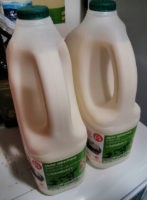06 Apr For Older Men, Dairy Food Intake Linked To Better Bone Health
MedicalResearch.com Interview with:
 Shivani Sahni, PhD
Shivani Sahni, PhD
Assistant Professor of Medicine, Harvard Medical School
Director, Nutrition Program
Associate Scientist, Musculoskeletal Research
Institute for Aging Research, Hebrew SeniorLife,
Boston MA 02131-1097
MedicalResearch.com: What is the background for this study?
Response: Previous studies have shown that higher milk intake is associated with higher bone mineral density. In one of our previous studies, we reported that higher dairy food intake was protective against bone loss especially among older adults who used vitamin D supplements. Older adults are at high risk of vitamin D deficiency because recommended intakes are difficult to achieve without fortified foods (such as dairy) or supplements. Vitamin D stimulates calcium absorption, which is beneficial for building bones. However, it is unclear if the effect of vitamin D on calcium absorption is substantial enough to translate into beneficial effects on bone.
Therefore, the current study determined the association of dairy food intake with bone health. We further examined whether these associations would be modified by vitamin D status.
MedicalResearch.com: What are the main findings?
Response: In this study using data from the Framingham Heart Study (1,522 men and 1,104 women, aged 32-81 years), we reported that in men, higher intakes of dairy foods such as milk, yogurt and cheese is associated with higher volumetric bone mineral density and vertebral strength at the spine. Dairy intake seems to be most beneficial for older men over the age of 50 years and continued to have positive associations irrespective of serum vitamin D concentration except for cream intake, which was associated with higher cross-sectional area. While we did not see many significant associations in women, it is important to note that women in this study were calcium replete because their calcium intake was at the recommended dietary intake level of 1200 mg per day.
MedicalResearch.com: What should readers take away from your report?
Response: The results of this study highlight the beneficial role of a combination of dairy foods upon bone health. The recommendation from the Institute of Medicine for dairy food intake is 3 servings per day, which would provide the essential bone beneficial nutrients such as calcium, vitamin D (from fortified dairy foods), protein and phosphorus. Following this recommendation could improve bone health in older men.
MedicalResearch.com: What recommendations do you have for future research as a result of this work?
Response: Future studies should consider nutrient profiles of specific dairy foods while researching the association of bone health. More research is needed to better understand the sex-differences seen in this current study. There is another study underway to further determine the role of dairy foods intake on bone micro-architecture measured using high resolution peripheral quantitative computed tomography (HR-pQCT), which non-invasively assesses compartment-specific bone density, micro-architecture and strength at peripheral anatomic sites of the distal radius and tibia.
MedicalResearch.com: Is there anything else you would like to add?
Response: Majority of the previous studies on this topic used areal bone mineral density from DXA and focused largely on milk intake. However, we have novel bone measures such as quantitative computed tomography (QCT) available in large epidemiological studies, which are unique because they provide information on bone geometry and compartment-specific bone density that are key determinants of bone strength. Therefore, we used these measures in the current study. Additionally, we examined serum 25-hydroxy vitamin D concentration, which is a better marker of vitamin D status compared with dietary intake or supplemental intake. In addition to milk, we also examined other dairy foods such as cheese and yogurt.
Citations: Laura H van Dongen, Douglas P Kiel, Sabita S Soedamah-Muthu, Mary L Bouxsein, Marian T Hannan, Shivani Sahni. Higher Dairy Food Intake Is Associated With Higher Spine Quantitative Computed Tomography (QCT) Bone Measures in the Framingham Study for Men But Not Women. Journal of Bone and Mineral Research, 2018; DOI: 10.1002/jbmr.3414
[wysija_form id=”3″]
The information on MedicalResearch.com is provided for educational purposes only, and is in no way intended to diagnose, cure, or treat any medical or other condition. Always seek the advice of your physician or other qualified health and ask your doctor any questions you may have regarding a medical condition. In addition to all other limitations and disclaimers in this agreement, service provider and its third party providers disclaim any liability or loss in connection with the content provided on this website.
Last Updated on April 6, 2018 by Marie Benz MD FAAD
